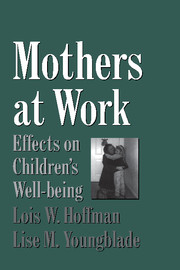Book contents
- Frontmatter
- Contents
- Preface
- 1 Introduction and Review of the Literature
- 2 Methodology
- 3 Children's Daily Family Lives: The After-School Day Interview
- 4 The Husband–Wife Relationship
- 5 The Mother's Well-being
- 6 Childrearing
- 7 Maternal Employment and Child Outcomes: The Direct Relationships
- 8 The Father's Role, Gender Attitudes, and Academic Outcomes
- 9 The Mother's Well-being and Child Outcomes
- 10 Childrearing Patterns and Child Outcomes
- 11 Nonmaternal Care and Supervision: Prevalence and Effects of Child-care Arrangements on Child Well-being
- 12 Summary and Overview
- Appendix: Measures Developed for This Study
- References
- Author Index
- Subject Index
11 - Nonmaternal Care and Supervision: Prevalence and Effects of Child-care Arrangements on Child Well-being
Published online by Cambridge University Press: 06 July 2010
- Frontmatter
- Contents
- Preface
- 1 Introduction and Review of the Literature
- 2 Methodology
- 3 Children's Daily Family Lives: The After-School Day Interview
- 4 The Husband–Wife Relationship
- 5 The Mother's Well-being
- 6 Childrearing
- 7 Maternal Employment and Child Outcomes: The Direct Relationships
- 8 The Father's Role, Gender Attitudes, and Academic Outcomes
- 9 The Mother's Well-being and Child Outcomes
- 10 Childrearing Patterns and Child Outcomes
- 11 Nonmaternal Care and Supervision: Prevalence and Effects of Child-care Arrangements on Child Well-being
- 12 Summary and Overview
- Appendix: Measures Developed for This Study
- References
- Author Index
- Subject Index
Summary
In this chapter, we turn from our concentration on maternal employment in the study sample to consider the related issues of child care and child supervision, with a focus both on national trends and findings of large, nationally representative studies and on results from our sample of families.
As outside employment becomes the norm for mothers of children of all ages in the United States, more and more families must find alternative care for their children. Considering that the majority of children will receive substantial care by adults other than their parents during their formative years before beginning elementary school, it is rather surprising how relatively little attention is given in our society to child care. Not only is research on the prevalence and effects of child care on children not as extensive as many other areas of literature on child development, but in the United States, government support for children of working parents lags far behind that of most other industrialized nations (Chilman, 1993). Very little financial help is available for families above the poverty line, either in the form of family subsidies or government-sponsored child-care centers, and regulations regarding child-care quality vary greatly between states and overall are much less stringent than both regulations in other areas of public health in the United States and child-care regulations in other countries (Chilman, 1993).
In this chapter we focus on three main issues related to child care and maternal employment: the prevalence of families' use of various types of nonmaternal care; the effects of such care on child functioning within emotional, social, and cognitive realms; and the related issue of supervision and monitoring of school-age children.
- Type
- Chapter
- Information
- Mothers at WorkEffects on Children's Well-Being, pp. 256 - 277Publisher: Cambridge University PressPrint publication year: 1999



